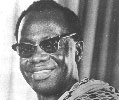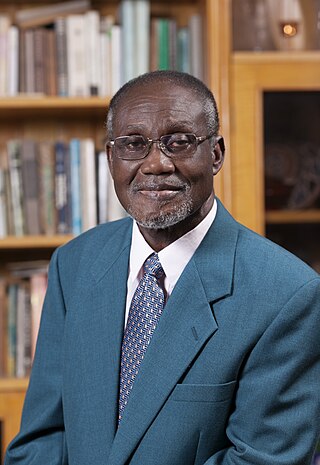Related Research Articles

The New Patriotic Party (NPP) is a centre-right and liberal-conservative political party in Ghana. Since the democratisation of Ghana in 1992, it has been one of the two dominant parties in Ghanaian politics, with its leading rival being the centre-left National Democratic Congress (NDC). John Kufuor of the NPP was President of Ghana from 2001 to 2009. At the elections held on 7 December 2004, the party won 129 out of 230 seats. The NPP candidate was Kufuor, who was re-elected as president with 52.75% of the vote. The New Patriotic Party symbol is the African elephant and the New Patriotic Party colours are red, white, and blue.

Edward Akufo-Addo was a Ghanaian politician and lawyer. He was a member of the "Big Six" leaders of the United Gold Coast Convention (UGCC) and one of the founding fathers of Ghana who engaged in the fight for Ghana's independence. He became the Chief Justice (1966–70), and later ceremonial President (1970–72), of the Republic of Ghana. He is the father of the current (executive) President of Ghana, Nana Addo Akufo-Addo.

Shinola

Aaron Mike Oquaye is a Ghanaian barrister and politician who served as the sixth Speaker of Parliament of the Fourth Republic of Ghana from 2017 to 2021. An academic, diplomat and Baptist minister, he previously held the cabinet ministerial portfolios for energy and communication and was also the High Commissioner of Ghana to India (2002–04) in the Kufuor administration.

The Parliament of Ghana is the legislative body of the Government of Ghana.
The United Gold Coast Convention (UGCC) was an early nationalist movement with the aim of self-government " in the shortest possible time" founded in August 1947 by educated Africans such as J.B. Danquah, A.G. Grant, R.A. Awoonor-Williams, Edward Akufo Addo, and others, the leadership of the organisation called for the replacement of Chiefs on the Legislative Council with educated persons. whose aim was to bring about Ghanaian independence from their British colonial masters after the Second World War. The United Gold Coast Convention appointed its leaders to include Kwame Nkrumah, who was the Secretary General. However, upon an allegation for plans against Nkrumah's leadership, he was arrested and jailed. The UGCC leadership broke up and Kwame Nkrumah went on a separate way to set up the Convention People's Party (CPP) for the purpose of self-governance. The UGCC was founded in Saltpond.

Obed Yao Asamoah is a Ghanaian lawyer, academic and politician. Asamoah was the longest serving foreign minister and Attorney General of Ghana under Jerry Rawlings from 1981 to 1997. Asamoah was educated at King's College London and at Columbia University.

William Ofori Atta, popularly called "Paa Willie", was a Ghanaian founding member of the United Gold Coast Convention (UGCC) and one of the founding fathers of Ghana as one of "The Big Six" detained by the British colonial government in the then Gold Coast. He later became a Minister for Foreign Affairs in Ghana's second republic between 1971 and 1972.
Ernest Eggay Kwesi Kurankyi-Taylor was a prominent Ghanaian judge and activist.
The United Party was the main opposition party in the First Republic of Ghana. It was the only opposition party throughout its existence from 1957 until 1964 when Ghana became a one party state.
Simon Diedong Dombo (1925–1998) was a Ghanaian politician, teacher and chief. He was a Member of Parliament that represented Jirapa-Lambussie District in the first Parliament of the first and second Republic of Ghana.
Mabel Dove Danquah was a Gold Coast-born journalist, political activist, and creative writer, one of the earliest women in West Africa to work in these fields. As Francis Elsbend Kofigah notes in relation to Ghana's literary pioneers, "before the emergence of such strong exponents of literary feminism as Efua Sutherland and Ama Ata Aidoo, there was Mabel Dove Danquah, the trail-blazing feminist." She used various pseudonyms in her writing for newspapers from the 1930s: "Marjorie Mensah" in The Times of West Africa; "Dama Dumas" in the African Morning Post; "Ebun Alakija" in the Nigerian Daily Times; and "Akosua Dzatsui" in the Accra Evening News. Entering politics in the 1950s before Ghana's independence, she became the first woman to be elected a member of any African legislative assembly. She created the awareness and the need for self-governance through her works.

Mustapha Abdul-Hamid is a Ghanaian politician and lecturer. He is currently the chief executive officer of the National Petroleum Authority (NPA).
Bukari Kpegla Adama was a Ghanaian politician and a minister of state in the Second Republic.
Horace Walter Kofi-Sackey was a Ghanaian lawyer and a politician who served as member of parliament in the Second Republic representing Bantama Constituency in the Ashanti Region of Ghana. He also held office as Ministerial Secretary for Works in the Busia government.
Akwasi Andrews Jones Amoako Atta Ofori Atta was a Ghanaian economist and politician. He was a senior lecturer in economics at the University of Ghana and served as ministerial secretary for Finance and Economic Planning in the Busia government.
Stephen Krakue was a senior quantity surveyor and politician. He was in the second republic as the deputy minister for Trade, Industries and Tourism.
The All People's Party was a former political party in Ghana. It was formed by the merger between the Popular Front Party (PFP) led by Victor Owusu, the United National Convention (UNC) led by William Ofori Atta and other parties in June 1981. It became the main opposition party in Ghana during the Third Republic until the military coup d'état on 31 December 1981 after which all political parties were banned by the Provisional National Defence Council. The ruling party at the time was the People's National Party under President Hilla Limann.
Danquah Institute is a political think tank based in Accra, Ghana. It was named after Dr. Joseph Boakye Danquah, a member of the Big Six and one of the founding fathers of Ghana. It aligns and promote the Danquah-Busia-Dombo ideology.
Joseph Adam Braimah was a Ghanaian politician, author and chief. In 1951, he was the first person from the Northern Region to be appointed as a Minister in Ghana and also a Member of Parliament. He was the first Ghanaian minister to resign from his position after confessing of taking bribe from Aksor Kasardjian, an Armenian contractor.
References
- ↑ Kipo, Daniel (2010), The Danquah-Dombo-Busia Tradition, ModernGhana.com, retrieved 2021-04-02
- ↑ AMOAKO, HENRY KWADWO (2021), Danquah-Dombo-Busia Tradition: Who was Dombo? tradition, African Research, retrieved 2021-04-02
- ↑ Tieku Gyansah, Henry (2021), Danquah-Dombo-Busia: A political tradition or a system for rotating presidential candidates among some selected ethnic groups, GhanaWeb, retrieved 2021-04-02
- ↑ Donkoh Fordwor, Kwame (2010), The Danquah-Busia Tradition in the Politics of Ghana: The Origins, Mission, and Achievements of the New Patriotic Party, Unimax Macmillan, 2010 - Ghana, ISBN 9789988044954